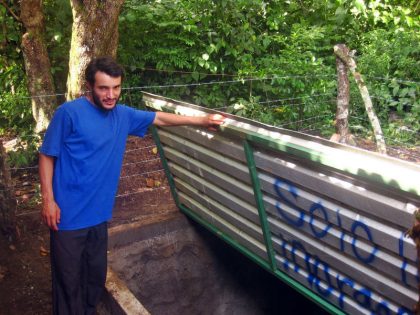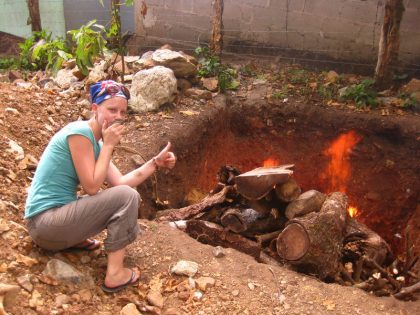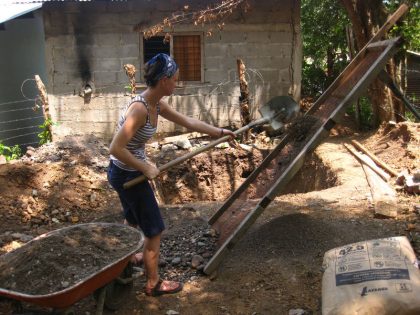 This project has been completed under the direction of Peace Corps Volunteer Alexandra Wilson. To read about the beginning of the project, CLICK HERE.
This project has been completed under the direction of Peace Corps Volunteer Alexandra Wilson. To read about the beginning of the project, CLICK HERE.
The project was designed as a solid waste management project to construct a small in-ground “landfill” in La Zona.
Alexandra reports:
The project of building a school landfill was finished after about three months of planning and building.
After securing the proper permissions and outlining an agreed-upon plan with the landowner and school principal, we dug a 7′ x 7′ x7′ pit directly behind the community’s school with almost entirely volunteer labor.
Unfortunately, an enormous boulder was found directly in the path of our digging, so we had to spend some additional money to hire a few days’ worth of labor to heat and break up the boulder. It was still only partially broken-up but enough so to provide adequate space for the landfill.
The pit was lined on the bottom with locally-sourced clay to provide impermeability. The walls were lined with multiple layers of cement. We constructed a roof out of sheets of corrugated tin and steel tubing.
The students were trained on how to properly use the landfill, as were the hired women who clean the school.
The landfill will be used to manage trash that cannot be either composted or recycled. It will eliminate the harmful effects of the prior practice of burning the plastics and other trash of the school. It will keep trash out of the water supply, thereby improving on the health and wellbeing of the students, teachers, staff, and community at large.
As a model project, the school landfill will provide an example to the families in the community of a better method of trash management. It is hoped that this will provide the stimulus for small family-sized landfills to be built.
Teaching the community about the harmful nature of burning plastics and the irresponsible and damaging effects of putting trash into the watershed do not carry much weight when there is no available alternative!
The building of a school relleno will provide an example to the families in the community of a better method of trash management. Once the idea is made a reality and the new practice made more comprehensible, smaller, family-size rellenos can be built.
We wish to thank Alexandra for completing this project, and again extend our gratitude to The Soneva SLOW LIFE Trust for providing the funding.

